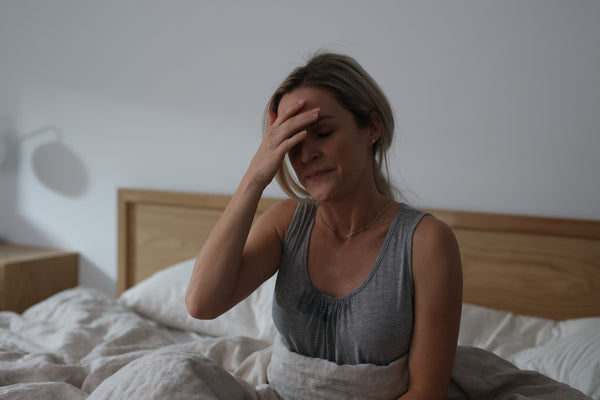Better Sleep for Women: Sleep Issues & Impact on Women's Health
Sleep Challenges for Women and Steps for Better Sleep
Sleep is vital to our health, yet many of us struggle with getting rest, with women disproportionately affected by sleep problems. Whether it's the demands of family, stresses of work, or hormonal changes unique to life stages, sleep can be elusive for many women. This guide aims to share the unique sleep challenges women face and provide strategies to improve sleep quality and quantity.

Why Women's Sleep Needs Are Unique: Women’s Sleep Challenges
Though women and men require the same amount of sleep—about seven to nine hours per night—women are 50% more likely to develop insomnia than men. Factors like hormonal changes associated with adolescence, menstruation, pregnancy, and menopause can affect everything from sleep quality to time required to fall asleep.
The Impact of Hormonal Fluctuations on Sleep
- Adolescence: As girls experience puberty and their first menstrual cycles, the discrepancy of insomnia rates between the sexes emerges.
- Menstruation: Fluctuations in estrogen and progesterone can disrupt sleep patterns, making it harder to fall asleep and stay asleep.
- Pregnancy: Hormonal changes, physical discomfort, and anxiety about childbirth can significantly impact sleep quality.
- Menopause: Decreases in estrogen levels contribute to sleep disturbances, hot flashes, and night sweats, causing sleep disturbances and excessive daytime sleepiness.
Social Factors Affecting Women's Sleep
Problems with sleep are not just a matter of biology; it can also be deeply intertwined with the social expectations and responsibilities women may face. Women are more likely to shoulder the majority of domestic work such as caregiving and managing the household despite being in a dual-earner family. Often, women face compounded pressures from home and work, ultimately inhibiting a woman’s ability to get restful sleep.
Caregiving and Household Responsibilities Affect Sleep for Women
A study in 2012 reported that 60% of families in the US are dual-income households, and yet despite that, women often still bear the primary responsibility of homemaker. A majority of women (59%) say they do more household chores and around three-quarters (74%) of mothers say they do more to manage their children’s schedules and activities than their spouse or partner.
The division of labor in the household skews heavily on women to shoulder. The domestic duties of a homemaker can disrupt sleep patterns, leading to fragmented sleep or difficulty finding time to wind down after a day of emotional and physical exertion. The constant need to remain alert and responsive in both work and at home can increase stress levels, further impairing sleep quality.
Heavier Mental Load for Women Impairs Sleep
Societal expectations for women to be the primary caretakers of home and family life contribute to "mental load" – the ongoing planning, organizing, and management of household activities and family schedules. Women perform a larger proportion of this unpaid mental labor, leaving many women lying awake at night, running through to-do lists, or worrying about the next day's challenges.
Furthermore. women experience more related negative consequences, such as additional stress, lower life and relationship satisfaction, and negative impact on their careers.

Workplace Stresses on Women’s Sleep
According to a study published on International Journal of Environmental Research and Public Health, job stress across gender is felt differently and when compared with men, women deal with a broader range of stressors at work. The study continues that "women perceive that they have to make greater efforts to prove their worth than men, this could be the cause of greater stress."
This could be in part "due to discriminatory behaviours in the [office] or perceptions based on preconceived ideas about the role of women in the workplace." Women, particularly in high-stress jobs or those working in male-dominated fields, may find it challenging to disconnect from work and relax, leading to difficulties falling asleep.
Strategies for Navigating Social Challenges Affecting Sleep
Understanding these unique influences is the first step toward mitigating their effects and restore healthy sleeping habits.
- Set Boundaries: Establish clear boundaries between work, personal time, and sleep time to help manage stress and protect your sleep schedule.
- Seek and Accept Support: Delegate and share caregiving/household responsibilities to alleviate some of the burdens that impact sleep.
- Prioritize Self-Care: Recognize that self-care, including sleep, is not selfish but essential, and to take the necessary steps to improve sleep hygiene.
- Education around Sleep: Be informed about the importance of sleep and your own advocate for broader lifestyle changes that benefit sleep.

Personal Strategies for Better Sleep
A restful night’s sleep is crucial for women's physical and mental health. By focusing on improving sleep hygiene, managing stress, and creating a supportive sleep environment, women can significantly enhance their sleep quality. Here are detailed strategies to empower your journey towards better sleep:
Prioritize Sleep as a Non-Negotiable Aspect of Self-Care
Recognize that good sleep is as vital as a balanced diet or regular exercise. Commit to ensure sleep is a priority in your life, understanding that this commitment is an act of self-care and self-respect.
Create a Relaxing Bedtime Routine
Create a calming bedtime ritual to signal your body it's time to wind down. Consider activities that relax the mind and body, such as:
- Warm Bath or Shower: The rise and subsequent drop in body temperature can promote sleepiness.
- Reading: Opt for a book over electronic devices to avoid blue light exposure.
- Gentle Yoga or Stretching: Release physical tension and calm the mind.
- Meditation or Deep Breathing Exercises: Reduce stress and prepare your body for sleep.
Optimize Your Sleep Environment
Transform your bedroom into a sleep sanctuary:
-
Comfort is Key: Invest in a quality mattress and pillows that support a restful night's sleep.
-
Keep It Cool: Maintain a slightly cool room temperature, ideally between 60-67 degrees Fahrenheit.
-
Invest in Temperature Regulating Bedding: Use cooling bedding products like Rest's Evercool® Cooling Comforter to minimize sleep disturbances (such as WASO - Wakefulness After Sleep Onset) from excessive heat.
-
Embrace the Dark: Use blackout curtains or a sleep mask to block out light, signalling to your brain that it's time to sleep.
-
Minimize Noise: Consider a white noise machine or earplugs to drown out jarring, disruptive sounds.
Manage Stress and Anxiety
Stress is a significant barrier to sleep. Implement stress-reduction techniques:
-
Journaling: Writing down worries or stressful thoughts can help clear your mind before bed.
-
Mindfulness Practice: Engage in mindfulness or relaxation techniques to calm the mind and body.
-
Set Boundaries: Learn to say no and set limits on work and social obligations to reduce stress.
Exercise Regularly but Mindfully
Regular physical activity can improve sleep quality, but timing matters:
-
Find the Right Time: Exercise in the morning or early afternoon to boost energy levels during the day and promote sleepiness at night.
-
Avoid Stimulating Activities Before Bed: Intense workouts close to bedtime can energize the body, making it harder to fall asleep.
Monitor Your Diet
What you consume can affect your sleep:
-
Limit Caffeine and Alcohol: Both can disrupt sleep patterns and should be especially avoided in the hours leading up to bedtime.
-
Eat Sleep-Promoting Foods: Incorporate foods rich in magnesium, calcium, and melatonin, such as bananas, almonds, and cherries, into your diet.
Embrace the Power of Napping Wisely
If you feel sleepy and need to nap, do so strategically:
-
Keep It Short: 20-30 minute nap can boost alertness without affecting nighttime sleep.
-
Avoid Late Afternoon Naps: Napping too late in the day can interfere with your ability to fall asleep at night.
Seek Professional Help When Necessary
If sleep problems such as chronic insomnia persist, consult a healthcare provider. Sometimes, underlying health issues like sleep disorders or hormonal imbalances need to be addressed to improve sleep quality.

These strategies for better sleep are designed to address the unique challenges women face in achieving much needed rest. By implementing these changes and prioritizing sleep as a critical component of overall health, women can enjoy the benefits of improved sleep, including better physical health, mental clarity, and emotional resilience. Remember, empowering yourself to improve your sleep is an investment in your overall well-being.



